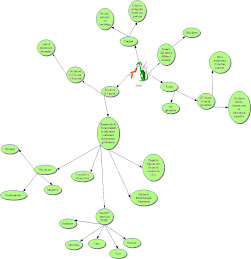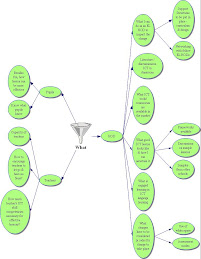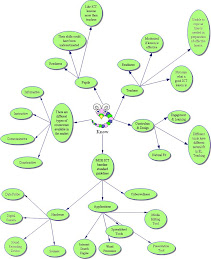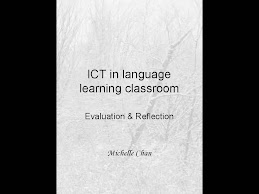It has been 10 weeks since I got to know Mae 812. Before I met her, I had doubts about our relationship. Although I know(Part 1) a little about Mae, I wanted to know (Part 2) more so that I can embrace her. I believe together, we can make a difference to our little ones. Week after week, we spent quality time together. Mae also got Phillip and Paul to chaperon us as we dated. The 2 men had ensured that we were well guided and that our relationship would develop and have an impact on our little ones. Phillip and Paul should be glad to note that Mae and I got along well. I also got to know Mae's family friends, Warschauser, Hubbard and Chapelle.
Here's what I gathered in my 10 weeks.
What I know
There are different types of courseware available in the market
•Informative
–News articles
–Video
–Animation
–Webquest
–Dictionary
•Instructive
–Drill & practice
–Online quizzes & games
–E-books
•Communicative
–Emails
–Weblogs
–Discussion forums
•Constructive
–Digital Camera
–Mindmapping software
MOE ICT baseline standard guidelines
The guidelines list a comprehensive set of ICT skill competencies where standards are benchmarked against overseas ICT standards
A. Applications
•Internet Search Engine
•Word Processor
•Spreadsheet Tools
•Presentation Tool
•Media Editing Tool
B. Hardware
•Data Probe
•Digital Camera
•Sound Recording Device
•Scanner
C. Cyberwellness
Pupils
•Like ICT lessons more than teachers
–Pupils always look forward to ICT lessons
–Different Classroom setup & learning environment
•Their skills could have been underestimated
–Teachers over-teach and underestimate pupils’ ICT skills and competencies
•Readiness
–Pupils’ skill acquisition
–Pacing pupil involvement
–Assessment modes/attitudes
Teachers
•Effective lessons take time to prepare
–Cluster Repository to pool ICT lessons from schools in the cluster
•Motivated if lesson is effective
•Classroom management is important
–Physical feature is different from classroom – mgt strategies also changed
•Readiness
–Capacity of teachers
–Pacing pupil involvement
Curriculum & Design
•Natural Fit
•Different tools have different natural fit in EL Teaching
•Engagement & Learning
What I want to know more about
Teachers
Capacity of teachers
•How to encourage teachers to let go & have no fears?
•How much teacher's ICT skill competencies necessary for effective lessons?
HOD
What changes have to be considered in order for change to take place
•Assessment modes
•Use of white space
•Expectations from department, school, parents
What good ICT lesson looks like & how I can ascertain it
•Samples from other schools
•Discussions on sample lessons
•Frameworks available
What I can do as Key personnel impact the change
•Networking with fellow middle managers
•Support Structures to be put in place - curriculum & design
What is considered engaged learning in ICT language learning
•What ICT tools/courseware are available in the market
•Literature reading /discussions on ICT in language classroom to keep abreast with the current trends and issues
Pupils
•Besides fun, how lessons can be made more effective
•Know what pupils know and do not know – not to underestimate their IT skills and over-teach
What I learn
Literacy
•Literacy has taken a different meaning
•Multi layer
Teachers
•Change in pedagogical beliefs and practices – cannot use what was successful in the 70s and expect to be effective
•Not sole authority of knowledge – pupils may possess better IT skills than teachers
•Tap and harness pupils’ IT skills to reach beyond limiting expectations
•Informed use of ICT in language learning add value
•Roles of teachers has enlarged
Pupils
•ICT cannot be easily generalised
•To achieve effects, learners must be autonomous proactive
•Not a replacement for textual practices
•Net generation
Resources & Support
Frameworks & Tools available to help select courseware and ascertain good lessons
•Good ICT lesson has CRISP.
–Productive
–Interesting
–Clear
–Short
–Relevant
•Warschauser
–Structural
–Communicative
–Integrative
•Towndrow's Mixing Desk
–Controls
•Teacher, pupil, strategy, support & outcome
•Hubbard's Methodological Framework
•Chapelle's Judgemental & Empirical Analysis of CALL
Resources
•Not limited to CD roms & E-portals
•Lots of resources in the market
My Appreciation
My sincere appreciation to Dr Phillip Towndrow & Dr Paul Doyle
Good teaching cannot be reduced to technique; good teaching comes from the identity and integrity of the teacher.
- Parker Palmer -
Special Feature
Hi Michelle,
This is Eleanor here. I have been trying in vain to post a comment on your blog since Friday. Just can't get in. Perhaps you can help me add my comment into your blog?
What an ingenious way to summarise your journey through MAE812 - personifying the course code! I love it! I also like the way you had split the K-W-L model into different webs, because there really is a lot to write for each one and I had problem fitting them all in; but you had solve the problem for me.
Thanks for categorising all our learning points under each subheadings too. It was very well done and quite inclusive. Great job, Michelle!
*Thank you, Eleanor.
Wednesday, April 9, 2008
Thursday, March 6, 2008
Is there a place for coursebook?
I believe that there will always be a place for coursebook.
Coursebook serves as guides for beginning teachers, inexperienced teachers and teachers who are users. Without it, teachers will have to become deisgners and realistically speaking, how many teachers are sufficiently competent to design not to mention to include language learning tasks.
I like to sight a discussion I overheard. A group of secondary school teachers were talking about one of the Geography coursebook written by one of the retired NIE lecturers.
Experienced Teacher said, "The book is too comprehensive. Too much resources provided and I'd rather use my own."
Senior Teacher claimed, "That it is a great book especially because I'm the only trained teacher in my school. The relief teachers will have no problem."
Another teacher claimed, "I did not select that particular coursebook but used it as supplementary resource."
The discussion above concurs that coursebook will still be necessary but the objectives, outcomes and use may be different to a large extent. To begin with, the format will be changed to an electronic coursebook where it allows the user to retrieve in parts or whole, modify and manipulate the information. Having a coursebook is like having a security blanket. If you run out of ideas, you can refer to it. It may not be the prescribed text for a target group but it definately has its place.
In future classrooms, pupils will go to school with PDAs and tablet PCs. It is happening in the tertiary campus. Every student now carries a laptop in campus and if they miss a class, they can always view the podcast of the lesson. I see the podcast lessons as a form of coursebook but in a different format. The accumulated lessons is an electronic coursebook. It has its purpose, audience and content.
Coursebook serves as guides for beginning teachers, inexperienced teachers and teachers who are users. Without it, teachers will have to become deisgners and realistically speaking, how many teachers are sufficiently competent to design not to mention to include language learning tasks.
I like to sight a discussion I overheard. A group of secondary school teachers were talking about one of the Geography coursebook written by one of the retired NIE lecturers.
Experienced Teacher said, "The book is too comprehensive. Too much resources provided and I'd rather use my own."
Senior Teacher claimed, "That it is a great book especially because I'm the only trained teacher in my school. The relief teachers will have no problem."
Another teacher claimed, "I did not select that particular coursebook but used it as supplementary resource."
The discussion above concurs that coursebook will still be necessary but the objectives, outcomes and use may be different to a large extent. To begin with, the format will be changed to an electronic coursebook where it allows the user to retrieve in parts or whole, modify and manipulate the information. Having a coursebook is like having a security blanket. If you run out of ideas, you can refer to it. It may not be the prescribed text for a target group but it definately has its place.
In future classrooms, pupils will go to school with PDAs and tablet PCs. It is happening in the tertiary campus. Every student now carries a laptop in campus and if they miss a class, they can always view the podcast of the lesson. I see the podcast lessons as a form of coursebook but in a different format. The accumulated lessons is an electronic coursebook. It has its purpose, audience and content.
My Fears
Fear #1
Before attending MAE812 I knew I do not have sufficient knowledge of the of the digital resources to maximise the use of ICT in my language classroom. I relied on the few popular ones that I was familiar with and planned the use revolving around them. I did not venture beyond where I was comfortable as I felt that I have neither the competency nor the energy to explore beyond. The fear within me then was - I do not know what I do not know.
Fear #2
After attending 7 sessions of MAE812, I realised that there is an ocean of digital resources which I could capitalise on. During the 7 sessions, I was 'enlightened' and now have a better understanding of ICT and its uses in the language classroom. The thoughts that I was aggressive in my promotion of ICT use was not because of my ignorance. There is a great gap between the Net Gen and I. The only way to bridge the gap is to admit that I do not know. The fear now is - I know what I do not know.
Eliminating my fears
Getting involve is the only way out.
1) Kudos to the class blogs. Networking is one of the effective ways to be informed.
2) Read to find out more. Digital life (a supplement of Straits Times) alone is not enough
3) Window shop at IT mall to be introduced to new gadgets (programmes/tools).
4) Work attachment - visit IT experts schools
5) Sign up as member of the COTF (Classroom Of The Future)
Before attending MAE812 I knew I do not have sufficient knowledge of the of the digital resources to maximise the use of ICT in my language classroom. I relied on the few popular ones that I was familiar with and planned the use revolving around them. I did not venture beyond where I was comfortable as I felt that I have neither the competency nor the energy to explore beyond. The fear within me then was - I do not know what I do not know.
Fear #2
After attending 7 sessions of MAE812, I realised that there is an ocean of digital resources which I could capitalise on. During the 7 sessions, I was 'enlightened' and now have a better understanding of ICT and its uses in the language classroom. The thoughts that I was aggressive in my promotion of ICT use was not because of my ignorance. There is a great gap between the Net Gen and I. The only way to bridge the gap is to admit that I do not know. The fear now is - I know what I do not know.
Eliminating my fears
Getting involve is the only way out.
1) Kudos to the class blogs. Networking is one of the effective ways to be informed.
2) Read to find out more. Digital life (a supplement of Straits Times) alone is not enough
3) Window shop at IT mall to be introduced to new gadgets (programmes/tools).
4) Work attachment - visit IT experts schools
5) Sign up as member of the COTF (Classroom Of The Future)
Wednesday, January 16, 2008
Using Digital Technology to Enable Teaching
Digital Technology used to be known to enhance teaching but now it is to enable teaching in order to prepare our learners for the 21st century. With that, the teaching strategies must also change accordingly for learning to take place more effectively in the new media age.
Educators can no longer hold on to the belief that the good old wine(strategies) will still be of interest when served chilled in the same old glass without innovations.
The challenges we faced today are far larger. Not only do we need to know what tools are available for our learners, we must also be able to determine what they need to know and what they can do with ICT. We have the capacity and schools the capability to ensure that the vision is realised
We have been guided and told 'How' things could be done. As such, we tend to 'overteach' thus underestimating the potential of our learners. What I think is really necessary is to teach our learners the skills to enable them to be able to source for the information by asking the 'correct' questions.
Questions! Have we as educators asked pertinent questions? Have we asked 'Why' ICT?
Disclaimer
Please note that the article posted is only for MAE812 Using ICT in the Language Classroom (Masters in Edn) discussion. It does not represent any group of educators and should not be quoted.
Educators can no longer hold on to the belief that the good old wine(strategies) will still be of interest when served chilled in the same old glass without innovations.
The challenges we faced today are far larger. Not only do we need to know what tools are available for our learners, we must also be able to determine what they need to know and what they can do with ICT. We have the capacity and schools the capability to ensure that the vision is realised
We have been guided and told 'How' things could be done. As such, we tend to 'overteach' thus underestimating the potential of our learners. What I think is really necessary is to teach our learners the skills to enable them to be able to source for the information by asking the 'correct' questions.
Questions! Have we as educators asked pertinent questions? Have we asked 'Why' ICT?
Disclaimer
Please note that the article posted is only for MAE812 Using ICT in the Language Classroom (Masters in Edn) discussion. It does not represent any group of educators and should not be quoted.
Sunday, January 13, 2008
Cyber-monk vs Cyber-teacher
Introduction
I chanced upon an article, "Should Monks Surf the Internet?" when I was surfing.
Resolution
I was convinced after reading it that I will not to let myself be left behind in the cyber world, buried in my work. If he(Venerable Pannyavaro) can do it, so can I!
How it can be done!
It takes a little 'push' though. If not for the course(MAE812) requirement, I would not have started a blog. I am now one step closer to the cyber world :) Thanks to Dr Paul Doyle and Dr Phillip Towndrow.
"Should Monks Surf the Internet?"
ICT in Buddhism
If Venerable Pannyavaro calls himself a 'cyber-monk' having found new tools and more sophisticated ways to spread the Dhamma, what are school teachers waiting for?
He said, "...monks, who have always had the role of teachers and scholars, are becoming increasingly computer literate. So it is the cyber monk, skilled in the new medium of the Internet, that will take the Buddha-Dhamma into the twenty-first century and beyond."
He added, "In the 21st century, Buddhism will be left behind as a museum piece if we do not harness ourselves to the new technologies and the Internet. "
He closed by saying, "I think the Buddha would have been quite at home using the new technology of the Internet to propagate his teachings."
Article link: http://www.buddhanet.net/
The article was quoted solely for the purpose of discussion.
I chanced upon an article, "Should Monks Surf the Internet?" when I was surfing.
Resolution
I was convinced after reading it that I will not to let myself be left behind in the cyber world, buried in my work. If he(Venerable Pannyavaro) can do it, so can I!
How it can be done!
It takes a little 'push' though. If not for the course(MAE812) requirement, I would not have started a blog. I am now one step closer to the cyber world :) Thanks to Dr Paul Doyle and Dr Phillip Towndrow.
"Should Monks Surf the Internet?"
ICT in Buddhism
If Venerable Pannyavaro calls himself a 'cyber-monk' having found new tools and more sophisticated ways to spread the Dhamma, what are school teachers waiting for?
He said, "...monks, who have always had the role of teachers and scholars, are becoming increasingly computer literate. So it is the cyber monk, skilled in the new medium of the Internet, that will take the Buddha-Dhamma into the twenty-first century and beyond."
He added, "In the 21st century, Buddhism will be left behind as a museum piece if we do not harness ourselves to the new technologies and the Internet. "
He closed by saying, "I think the Buddha would have been quite at home using the new technology of the Internet to propagate his teachings."
Article link: http://www.buddhanet.net/
The article was quoted solely for the purpose of discussion.
Subscribe to:
Posts (Atom)
cybermonk va cyberteacher
Cybermonk vs cyber teacher
Take time to appreciate the obvious



